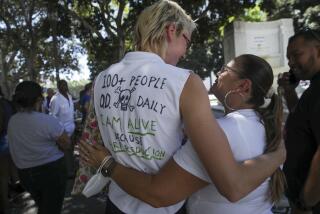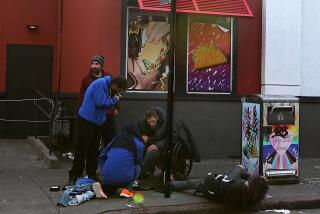A New Look at Drug Use
The results of a government survey released this week show just how little America’s real drug problem resembles the one discussed on most of the country’s political platforms.
According to the study, which was conducted by the National Institute on Drug Abuse, the use of illegal drugs among all Americans has declined sharply over the past three years. Even consumption of cocaine, a substance that continues to generate huge profits for the criminal underground, fell 33% between 1985 and 1988. This is not to say that drug abuse does not continue to be a significant problem for many Americans. Based on their study, the federal researchers believe that 2.9 million of our countrymen used cocaine at least once a month last year. Clearly, that number is unacceptable. However, it is equally clear that the means of attacking the problem already at hand--enforcement of existing laws, a greater emphasis on education and treatment and a general expression of social disapproval--are having a positive effect.
This suggests that, when they are adequately informed and cautioned, people with a decent standard of living and the capacity to make rational calculations about consequences will not choose the self-destruction of drug abuse.
Unfortunately, a significant number of people do not meet these criteria, and it is their tragic circumstances that constitute what most national politicians are describing when they speak of “the drug crisis.” By and large, these are the estimated 2.5 million poverty-stricken Americans who belong to the permanent underclass, most of whose members live in segregated inner-city neighborhoods. Between 1970 and 1980, the population of such areas increased by 230%. For these people, drug abuse, particularly the use of cheap, highly addictive crack cocaine, is simply the most flamboyantly public symptom of their apparently hopeless situation. As the federal study’s findings suggest, it also is a symptom on the increase.
How to address this intractable part of the drug problem is what ought to preoccupy our political leaders. Some among them look on other Americans so deprived and discontented that they have become self-destructive and see not human misery, but indiscipline. Their remedy is coercion.
The Rev. Jesse Jackson, on the other hand, describes inner-city drug abuse as an expression of “self-hatred and self-exploitation.” While agreeing that existing laws must be vigorously enforced, he also argues that “the whole environment that leads to drug use must be changed”. To that end, he advocates “prenatal care, day care, Head Start, job training, affordable housing, jobs with some purpose” and an increase in the minimum wage. We agree. Politicians, no less than drug users, must abandon their addiction to instant gratification.
More to Read
Sign up for Essential California
The most important California stories and recommendations in your inbox every morning.
You may occasionally receive promotional content from the Los Angeles Times.










